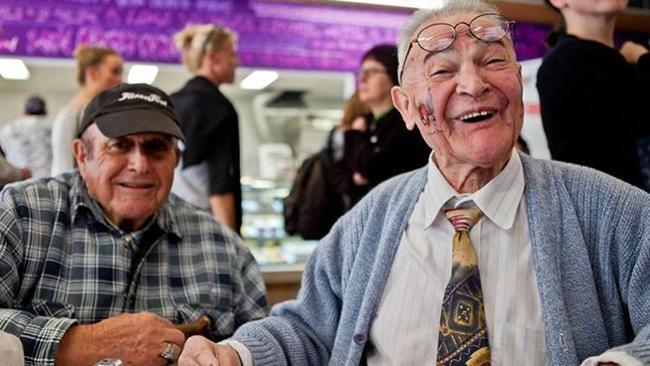Life lessons from the Wayside Chapel in Sydney's Kings Cross
SOCIETY is falling apart. We are lonelier and more depressed than ever before. But one man hasn't given up on us, and his book extract might just make you weep with joy. Or hope.

Books & Magazines
Don't miss out on the headlines from Books & Magazines. Followed categories will be added to My News.
This is an edited extract from the introduction of Love Over Hate, Finding life by the wayside, by Graham Long.
THE Western world has achieved so much, and yet, I believe, has constructed an environment where humans are lonely. We live in a culture that focuses on the self, or 'I' - what I call within these pages the 'privatisation of the self'.
We are connected to each other via our clever technological devices, but these same devices allow us to hide from the world of real breathing human beings. There is a crack in the foundation of Western culture.
The structure is wobbling and we are in trouble. These problems are magnified in cities like Sydney (where I live), where infrastructure has not kept pace with growth. Sydney is a city in a hurry. The number of cars at peak hour each morning has radically increased in just five years. In my mind, 'peak hour' is a euphemism for 'sitting stationary for ages on a road that you have paid a toll to travel on'.
By the time Sydneysiders get to where they are going, there is no time left for small talk. It is easy to become invisible in any city. It is easy to occasionally become unstuck negotiating the complexities of modern life.
It is easy to be in a place where owning your own home is a dream simply out of reach. It is easy to be in a place where having any home at all is simply out of reach.
Lack of money, and lack of familial and social support can soon enough usher an individual to a place of invisibility.
Homelessness usually comes with side servings of mental health issues and addiction. I am the pastor and CEO of The Wayside Chapel in Sydney's Kings Cross and so the views I express in this book come from the gutter up, rather than from a university or Parliament House down. They have been formed out of the extraordinary journey I have shared with so many, and this book tells the story of my life as a backdrop to what I have seen along the way.
They are not necessarily the views of The Uniting Church in Australia, nor do they speak in any social way on behalf of The Wayside Chapel. They are mine alone.
For nearly 50 years, The Wayside has been something of a social contradiction, offering hospitality to all-comers and a place of welcome to those who have worn out their welcome elsewhere.
My job is tough. I've found that the greater the damage - be it emotional or physical - that an individual has sustained along the way, the greater their sense of entitlement. And the more you give an entitled individual, no matter if they are rich or poor, the greater their sense of entitlement, they cannot accept what is given to them as a gift because they don't see the giver, only stuff.
There is no 'other' in the world of 'I', there is just 'stuff'. The task in the world of 'I' is to get as much 'stuff' as you can for the cheapest price.
My job at The Wayside is not so much to help people feel more comfortable in the world of 'I' as it is to persuade them out of this familiar but miserable place and into the world of 'we'. This is more difficult than it sounds.
I have to be on the lookout for a spark of hope. It may happen on the day when someone is sick of being sick, or when they wake up and see that they are being offered a gift by someone. There is a world of difference between a 'giver' and a 'source of stuff'. It is on that day when the addicted wake up and realise they are not alone, when they see they are not alone as they go through what they are going through. Indeed, the sufferings of humanity are commonly felt, and are in common with each another.
At The Wayside, we tell people they are not 'problems' to be solved but rather 'people' to be met. We know we have had a good day if someone walks out our front door feeling 'met', rather than 'worked on'.
Mostly, people anticipate they will be treated as problems rather than as persons - indeed, most seem to insist on it, as this has been their experience in the past - but to flourish as a person, the essential ingredient is to know that you belong with others.
The cheap way to meet this need is to join a group of people who become 'us' and who know that being 'us' is superior to being one of 'them', anyone not part of 'our' group. So much energy is wasted assuring ourselves it is better to be one of 'us' than one of 'them'.
It seems almost beyond comprehension that something as insignificant as skin colour or a belief, such as religion, where the fundamental aim is towards the good of humanity can be so divisive. And yet, that is what is happening to society, on a grand scale. It is better for people to know that every person is a brother or a sister and that human frailty is common to us all.
We are all 'we' not 'us' or 'them'. It is odd, but true, that in Western culture many people "fight off the very thing they need the most. We are trained finding connections in a lonely world is to see the very people with whom we need to make a connection as our competitors, or inferiors, as 'them'.
But magic happens, sometimes. The brightest lights shine in the darkest places, and quite often in Kings Cross the best of humanity is seen, even in a suburb famous for being a place where the worst of humanity is revealed.
The barriers that such thinking creates can never be overcome permanently, but they can most certainly be overcome in moments of meeting, and it is in such moments that we truly see. If you look from afar you see 'them'.
When you meet, you see 'we'. This book is about looking for and finding life as 'we'. It is about learning true power by embracing the kind of weakness where one can connect and make room for others. It is about entering into the joy of being human, which is simply the joy of being together.
And it is about finding life's treasure in the last place you would normally look for it - by the wayside.
This is an edited extract from the introduction of Love Over Hate, Finding life by the wayside, by Graham Long. Published by Slattery Media Group.
Find out more about The Wayside Chapel.
###


